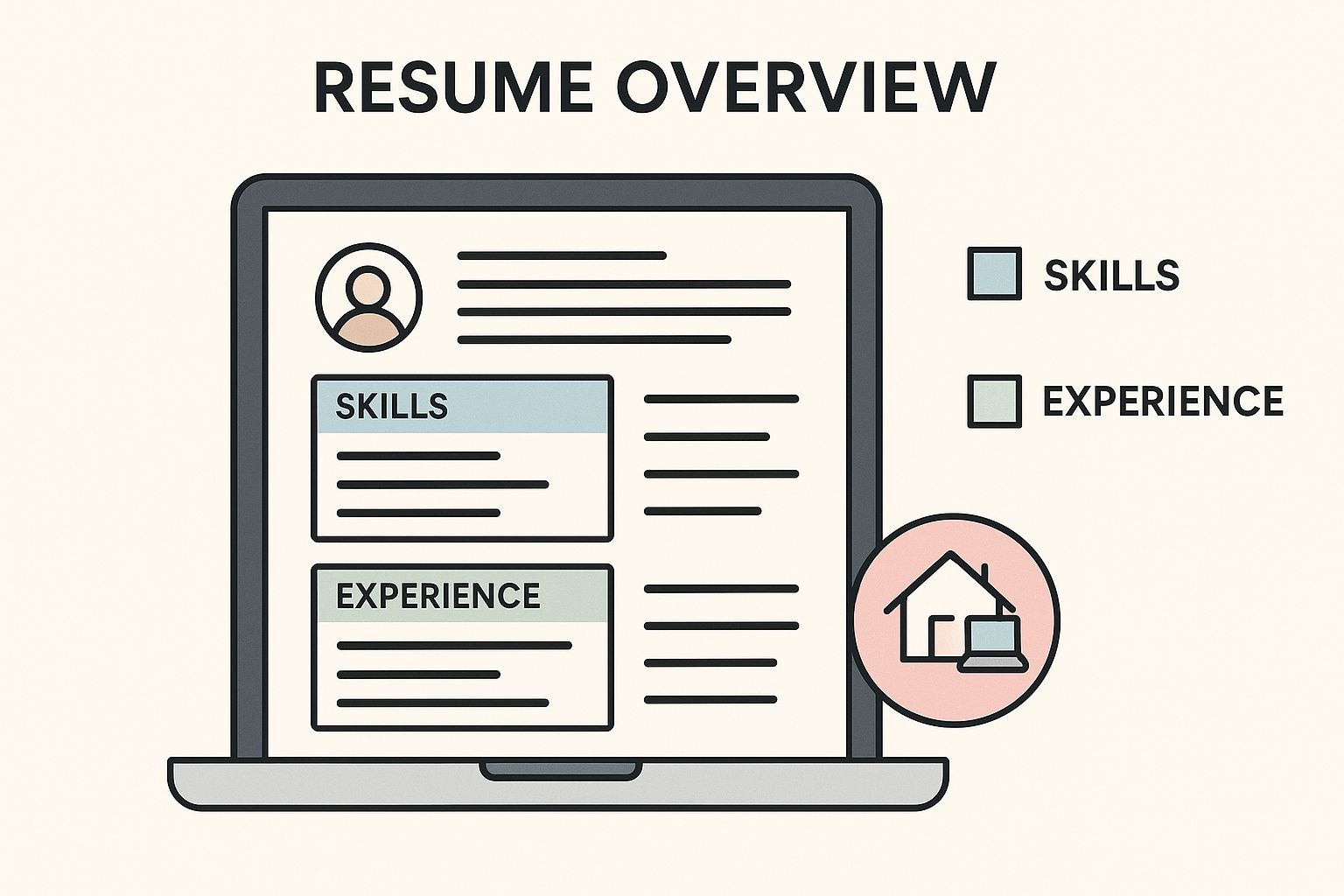
How to Find Remote Jobs And Land Your Next Role
Finding a great remote job isn’t about blasting your resume across the big job boards anymore. It’s about a smarter, more focused strategy. You need to zero in on niche, remote-first platforms, tweak your resume to scream “self-starter,” and get active in the online communities where your future boss is already hanging out. This is how you cut through the noise in a very crowded market.
Navigating the Modern Remote Job Market
Before you jump in, let’s get a clear picture of what the remote job market actually looks like today. The initial gold rush has calmed down, but the landscape is still very much in flux. Understanding the reality on the ground will help you set realistic goals and put your energy in the right places.
The bottom line? Competition is fierce, but the demand for flexibility from people like you and me is stronger than ever.
The Reality of Remote Job Competition
Even though you might see headlines about companies pushing for a return to the office, the desire for remote work hasn’t gone anywhere. If anything, it’s intensified. This means that remote and hybrid roles get absolutely swamped with applicants.
Let’s look at the numbers. While fully remote or hybrid jobs make up only about 20% of all postings, they pull in a staggering 60% of all applications. That’s a huge mismatch and it shows just how many people are fighting for the same flexible roles. For a deeper dive into these kinds of numbers, the Aura blog on remote work trends has some great data.
I’m not showing you this to scare you off, but to prepare you for what’s ahead.
A successful remote job search isn’t a numbers game of applying everywhere. It’s a game of strategy—positioning yourself correctly, proving you can crush it without a manager over your shoulder, and knowing where to find the hidden gems others miss.
Where the Opportunities Are Hiding
So, where should you be looking? Some industries have truly embraced remote work for the long haul. They’ve already built the culture and systems needed to make distributed teams successful.
Focusing your search here is a smart move.
- Tech: This is the obvious one. Software development, cybersecurity, data analysis, and IT support are still the bedrock of remote work.
- Marketing & Media: Roles like digital marketing, content creation, social media, and PR are a natural fit for remote life.
- Professional Services: Fields like consulting, accounting, and project management have adapted seamlessly.
- Customer Support: Companies need people in different time zones, so remote customer service and success roles are always in demand.
Knowing which fields are hot helps you fine-tune your search. Instead of just typing “remote jobs” and hoping for the best, you can get specific and hunt for roles in these high-potential areas, which dramatically improves your odds of finding a great fit.
Finding Quality Remote Job Opportunities
If you’re only scrolling through massive, generic job boards, you’re doing it wrong. It’s like trying to catch a specific type of fish by casting a giant net into the middle of the ocean—you’ll get a lot of junk and waste a ton of time. The real secret to landing a great remote role is knowing where to look, and that means going beyond the usual suspects.

This image nails it. For remote roles, hiring managers are scanning for very specific things: clear evidence of your skills, directly relevant experience, and proof that you can thrive without someone looking over your shoulder. You have to make those elements jump off the page.
Start with Remote-First and Niche Job Boards
Instead of getting lost on sites where remote is just a filter option, start your search on platforms built from the ground up for remote work. These sites are a different breed. The listings are almost always curated, which means higher quality and far fewer “remote-friendly” or hybrid roles masquerading as the real deal.
Here are a few of the best places to focus your energy:
- FlexJobs: Yes, it’s a subscription service, but that paywall is its greatest strength. It keeps the scams and low-effort listings out. Every single job is hand-screened for legitimacy and actual flexibility.
- We Work Remotely: As one of the largest remote-specific communities out there, this is a go-to for high-caliber roles, especially in the tech and startup world.
- Remotive: This is more than just a job board; it’s a whole ecosystem. You get access to quality listings, a community Slack channel, and a newsletter that’s actually packed with good opportunities.
Don’t stop there. Think about your specific industry. Are you a designer? The Dribbble job board has a fantastic remote section. A writer? The ProBlogger board is a classic for a reason. Digging into your industry’s niche sites is how you find the hidden gems that never even make it to the bigger platforms.
Top Platforms for Finding Remote Jobs
To make it easier to see where you should spend your time, here’s a quick breakdown of the top platforms.
| Platform | Best For | Key Feature | Pricing Model |
|---|---|---|---|
| FlexJobs | Professionals seeking vetted, scam-free flexible and remote roles across all industries. | Every job is hand-screened by a real person for legitimacy and remote-friendliness. | Subscription-based |
| We Work Remotely | Tech and startup professionals looking for high-quality, competitive remote positions. | Largest remote work community with a strong focus on tech roles. | Free for job seekers |
| Remotive | Job seekers who want community support alongside their job search. | Active Slack community and curated newsletter alongside the job board. | Free for job seekers |
| Industry Niche Boards | Specialists (e.g., designers, writers) seeking roles tailored to their specific skills. | Highly relevant listings that are often not posted on larger, generalist sites. | Varies (Often free) |
Each platform serves a slightly different purpose, so mixing and matching is your best bet for a comprehensive search.
Go Beyond the Job Boards
Here’s a piece of advice from years of experience: the very best remote jobs often never see a public job board. They’re filled through referrals or by proactive candidates who found their way to the company directly.
The most sought-after remote jobs are often filled through internal referrals or direct applicants before they are ever publicly listed. Your goal is to get in front of these opportunities before the masses do.
A powerful way to do this is by embedding yourself in professional Slack or Discord communities for your field. These are living, breathing hubs where people share advice, network, and—most importantly—drop job openings directly from their own companies. If you’re in marketing, a group like “Demand Gen Geeks” could be the source of your next perfect-fit role.
Another killer strategy is to curate your own list. Identify 20-30 remote-first companies you admire and would genuinely love to work for. Bookmark their career pages and make a habit of checking them once a week. This direct approach not only shows real initiative but lets you sidestep the noise and competition entirely. To make this process even smoother, you can look into the best AI tools for job seekers that can help you track openings and even assist with applications.
Building a Resume and Profile That Screams “Remote-Ready”

Think of your resume as your opening argument. When you’re applying for a remote job, a generic resume just won’t cut it. You have to prove, right from the first glance, that you have the unique traits needed to thrive without someone looking over your shoulder.
Every single bullet point needs to answer the hiring manager’s biggest unasked question: “Can this person actually get things done without direct supervision?” This means you need to shift your mindset from simply listing job duties to actively showcasing your remote-friendly skills and accomplishments.
Showcasing Your Remote Superpowers
Here’s the good news: you probably already have remote work skills, even if you’ve never had a “remote” title. The key is learning how to translate what you’ve already done into the language that remote-first companies understand.
Think about any time you took charge of a project, managed your own schedule, or worked with people in different departments or offices. Those are the experiences you need to put front and center.
Here’s what to focus on:
- Self-Management and Autonomy: Did you own a project from start to finish? Use powerful action verbs. Instead of “responsible for,” try “spearheaded,” “drove,” or “independently managed.”
- Proactive Communication: Mention specific collaboration tools you’ve used like Slack, Microsoft Teams, or Trello. Frame it as “facilitated seamless cross-functional communication” or “maintained project alignment using asynchronous tools.”
- Tech-Savviness: Go beyond the basics. List any project management software (Asana, Jira), CRMs, or industry-specific platforms you’ve mastered. This instantly shows you can jump into a modern tech stack with little hand-holding.
Pro Tip: Don’t bury these skills. Create a dedicated “Core Competencies” or “Remote Work Skills” section right at the top of your resume, just below your summary. A recruiter’s eyes will land there first, immediately signaling that you get what they’re looking for.
Translating Your On-Site Experience for a Remote World
Let’s re-examine your last in-office job through a remote lens.
Did you ever work with a client in a different time zone? That’s remote collaboration. Did you send detailed weekly progress reports to your boss? That’s excellent asynchronous communication.
It’s all about framing. You’re not trying to invent experience; you’re highlighting the discipline, communication habits, and results-driven attitude you’ve already demonstrated.
For instance, a standard resume might say, “Managed sales accounts.”
A remote-ready version sounds like this: “Independently managed a portfolio of 15 sales accounts, exceeding quarterly targets by 18% through proactive client communication via email and video calls.”
See the difference? The second one screams autonomy, communication, and, most importantly, results. If you’re struggling to find the right words, a good AI resume builder for free can be a huge help in rephrasing your accomplishments for maximum impact.
Polishing Your Digital Footprint
Your resume is only half the story. Your LinkedIn profile needs to echo the same message.
Start with your headline. Make sure it includes keywords like “Remote” or “Distributed Teams.” Then, use your summary to tell a story about your remote work ethic, your communication style, and why you thrive in an autonomous environment.
Finally, your online portfolio, personal website, or even a well-organized GitHub profile acts as undeniable proof. It’s one thing to say you’re a self-starter. It’s far more powerful to show a collection of projects you built and completed on your own. This digital evidence is often the final piece of the puzzle that convinces a recruiter to hit the “invite to interview” button.
Tapping Into Your Network to Find Hidden Remote Jobs
Here’s a hard truth most people learn too late: the best remote jobs rarely make it to a public job board. Seriously. The most sought-after, high-impact roles are often filled through internal referrals or professional connections before a formal job description ever sees the light of day. This is the “hidden job market,” and networking is your only way in.
But let’s be clear—this isn’t about sending awkward, transactional messages to strangers. It’s about building a genuine reputation, sharing what you know, and becoming a trusted name in your space. When you nail this, opportunities will start finding you.
Go Where the Pros Are: Niche Online Communities
Stop scrolling aimlessly through your main LinkedIn feed. The real action is happening in highly-focused online communities dedicated to your specific craft. These are the places where people in your field are actually talking shop, solving real problems, and, you guessed it, posting jobs from their own companies.
You need to find the digital equivalent of the local industry meetup.
- Slack and Discord Channels: Nearly every profession has a few go-to Slack or Discord communities. A project manager might live in a group dedicated to Agile practices. A content strategist might hang out in an SEO-focused community. These are your people.
- Specialized Forums: Don’t write off platforms like Reddit or industry-specific forums. Subreddits like r/digital_marketing or r/sysadmin are packed with seasoned pros who are happy to share their knowledge.
The game plan is simple: show up and be genuinely helpful. Jump in on discussions, answer questions when you can, and share your own experiences. People notice that. You’re building credibility and name recognition long before you ever need to ask for a favor.
Use LinkedIn the Right Way
Your LinkedIn profile is so much more than an online resume. It’s a powerful networking tool, but only if you use it with a bit of strategy. Ditch the generic, “I’m looking for a job” messages you’re tempted to copy and paste to recruiters. Instead, build real connections with people at companies you actually want to work for.
Start by following 20-30 remote-first companies that excite you. Don’t just follow—engage. Leave thoughtful comments on their posts and on the content their employees share. When you finally decide to reach out, you’ll have a real reason to. Reference a recent product launch or a blog post they wrote that you genuinely found interesting. This simple step turns a cold, forgettable message into a warm conversation.
The point of networking isn’t to directly ask for a job. It’s to build a relationship, so when a role does open up, you’re the first person that comes to mind. That small shift in perspective changes everything.
This approach is becoming more crucial every day. By 2025, it’s projected that over 32.6 million Americans will be working remotely, making up about 22% of the entire workforce. This isn’t just a tech trend anymore; fields like marketing, finance, and education are all going remote. You can find more data on the state of remote work from Neat. With a bigger talent pool than ever, those personal connections are what will truly set you apart.
Mastering the Remote Job Interview
Getting the email for a remote interview feels like a huge win. But this is where the real work starts. A video interview isn’t just a traditional meeting moved online; it’s a totally different ballgame, and it demands a unique skill set. The hiring manager isn’t just looking at your resume—they’re evaluating your ability to connect, communicate, and look professional through a camera.
More than anything, you need to prove you have the self-discipline and communication chops to thrive without someone looking over your shoulder. That proof starts well before you ever click “Join Meeting.”
Setting the Stage for Success
First things first: get your environment under control. I’ve seen great candidates get undermined by poor lighting or a messy, distracting background before they even say hello. You don’t need a fancy studio, just a little forethought.
- Light it up: Make sure your main light source (like a window) is in front of you, not behind you. Sitting with a window at your back turns you into a silhouette. A simple ring light is a cheap and effective fix for this.
- Curate your background: A clean, professional backdrop is a must. Think tidy bookshelf, a neutral wall with one piece of art, or a tasteful virtual background. Avoid anything that pulls focus away from you.
- Do a tech check: Hop on a quick call with a friend. Is your camera at eye level? Is your microphone clear? Is your internet connection stable? Iron out the kinks now, not during the actual interview.
These little details send a powerful message: you’re organized, you’re serious, and you’re ready for remote work.
Answering Remote-Specific Questions
When hiring for a remote position, managers are digging for proof that you can handle the autonomy. They’ll ask pointed questions to get a feel for your communication style, your drive, and your ability to work independently.
You should be ready for questions like:
- “How do you keep yourself motivated and on task when you’re working alone?”
- “Tell me about your experience using asynchronous tools to collaborate.”
- “How do you resolve a miscommunication with a colleague in a different time zone?”
Your answers can’t just be theoretical. This is where you need to bring in real-world stories. Use the STAR method (Situation, Task, Action, Result) to frame your examples. Talk about a specific project you owned, a time you used a tool like Slack or Asana to get everyone on the same page, or how you went the extra mile to communicate clearly to avoid confusion.
Showing you have this experience is more important than ever. As of early 2025, about 22.8% of US employees were working remotely at least some of the time. Landing one of these roles is often linked to experience, with 42.8% of Americans with advanced degrees working remotely compared to just 9.1% of those with only a high school diploma, according to data on remote work participation from Backlinko. Your interview is your shot to prove you belong in that group.
Projecting Confidence and Building Rapport
It’s tough to build a genuine connection through a screen, but it’s absolutely critical. The trick is to look directly into the camera lens when you’re speaking, not at the interviewer’s face on your monitor. It creates the illusion of direct eye contact. Use active listening cues—nodding, smiling—to show you’re locked in.
Once the call ends, your work isn’t quite done. A thoughtful follow-up email is your final chance to make a great impression. It reinforces your enthusiasm and, just as importantly, shows off the proactive communication skills they’re looking for. For a complete walkthrough, check out our guide on how to write the perfect application follow-up email. It’s a small step that can make all the difference.
Common Questions About Finding Remote Work

If you’re diving into the remote job search, you’ve probably got questions. It’s a different world than traditional job hunting, and it’s completely normal to wonder about everything from breaking in without experience to dodging the scams that lurk online.
Getting solid answers is the first step. Let’s clear up some of the most common questions I hear so you can focus your energy on what actually works.
How Do You Find Entry-Level Remote Jobs?
This is the classic catch-22, isn’t it? So many remote jobs seem to demand previous remote experience. It can feel like an impossible hurdle.
The trick is to stop hunting for “entry-level remote” titles and start thinking about remote-ready skills. You need to show you can thrive without a manager looking over your shoulder.
A great place to start is by looking at roles that naturally lend themselves to a remote setup, like customer support, data entry, virtual assistance, or even content moderation. Companies hiring for these positions often bring on large teams and have solid virtual training programs already in place. They’re built to get new remote hires up to speed.
Here’s how to frame your approach:
- Showcase Your Remote-Ready Skills: Don’t just list your past duties. On your resume, highlight examples of your self-discipline, proactive communication, and your comfort with digital collaboration tools.
- Look for “Remote Training” Clues: Scan job descriptions for phrases like “structured virtual onboarding” or “comprehensive training program.” These are green lights that a company is ready and willing to invest in new talent.
- Get a Foot in the Door: A short-term contract or a remote internship can be your golden ticket. It gives you that critical line item on your resume and proves you can deliver results from a distance.
Can You Find International Remote Jobs?
Absolutely, but it’s not as simple as just applying to a job in Paris from your home in Omaha. While the dream of working for a company halfway around the world is more possible than ever, you’ve got to be realistic about the logistics. The two biggest roadblocks are almost always time zones and legal/tax compliance.
You’ll find that many international listings are actually “remote within a region” (e.g., North America only, EU only). This makes life much easier for the company when it comes to payroll, benefits, and having some overlap in working hours.
The real secret to finding a truly global role is to hunt for “asynchronous-first” companies. These organizations have built their entire culture around the idea that people work on their own schedules. Your physical location becomes a minor detail, not a dealbreaker.
To find them, try searching with keywords like “global,” “asynchronous,” or “time-zone agnostic” on remote job boards. And always be upfront about where you are and your legal right to work. Honesty from the start saves everyone a headache and connects you with companies that are genuinely equipped for a global team.
How to Spot and Avoid Remote Job Scams
Unfortunately, the boom in remote work has also led to a boom in scams. Protecting yourself means learning to recognize the red flags before you waste your time or, worse, lose your money.
First thing to remember: A legitimate company will never ask you to pay for your own equipment or training as a condition of employment. That’s a huge red flag.
Keep your guard up and watch out for these warning signs:
- The job description is incredibly vague, but the salary is unbelievably high.
- All communication comes from a personal email address (like a Gmail or Yahoo account) instead of a corporate domain.
- The “interview” is conducted entirely over a chat app like Telegram or Signal.
- They ask for sensitive information like bank account numbers or your social security number before you’ve seen or signed a formal offer letter.
- There’s pressure to buy software or equipment from a specific “approved” vendor.
Do your homework. A quick search for the company’s website and LinkedIn profile can tell you a lot. If something feels off or too good to be true, trust your gut. It almost always is.
Ready to stop spending hours tailoring your resume for every application? Jobcamp uses AI to instantly create customized resumes and cover letters that get you noticed. Upload your resume, paste a job link, and let our platform handle the rest so you can apply faster and land more interviews. Get started with Jobcamp for free today.

